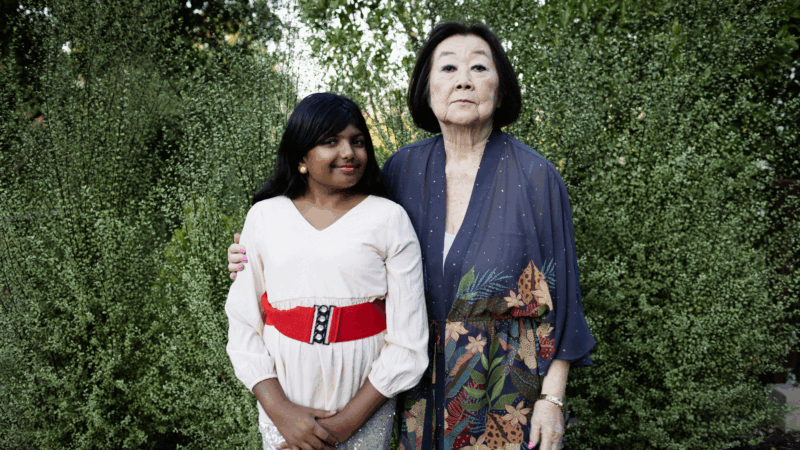NPR’s middle school champion: A moving podcast about Japanese incarceration
When Ameya Desai won the fourth grade prize of NPR’s Student Podcast Challenge last year, something surprising happened: A neighbor reached out asking if the 11-year-old journalist would interview his grandmother, a survivor of the Japanese incarceration camps.
Ameya was amazed, shocked that she had never learned this history before, one that takes place in her hometown, San Jose, Calif.
That spark led her to 85-year-old Linda Horikawa, who recalls being “surprised that someone in the fifth grade was interested in the relocation of Japanese Americans during World War II.”
Horikawa was hesitant at first. Then she thought: “It was a good time to tell everyone what really happened.”
The result is Ameya’s podcast, Shikata Ga Nai, Far From Home: Stories of Forced Migration.
The story begins in 1940, on a berry ranch in Cupertino, Calif. “We had boysenberries, blackberries and strawberries,” she tells Ameya. “We were very happy there.”
But those happy times at the family farm were soon upended, when Horikawa was 2 years old.
“Following the Japanese attack on Pearl Harbor, there was a growing resentment towards Japanese Americans, many of whom were questioned about their loyalty to the United States,” Ameya explains in the podcast.
In 1942, the United States forced roughly 120,000 Japanese Americans to leave their homes on the West Coast.

Horikawa shares vivid, chilling details about life in the incarceration camp in Heart Mountain, Wyo., like guns pointed at her family upon arrival. They were put in tar-paper shacks. Her entire family shared one room with no running water, just a stove for eating. No individual bathrooms, but a tight row of toilets for everyone to share.
And it was three years before they were able to return to California. Even then, it wasn’t easy integrating back to a community they once called home.
“There was prejudice,” Horikawa says in a watery voice. “Kids would say to us, ‘your eyes go like this.’ But it affected my parents more. I saw that the joy that they had in life was kind of gone.”
Reopening a trunk full of history
Our judges picked Ameya’s podcast from nearly 2,000 entries we received this year. They were moved by Horikawa’s story, and charmed by the care and curiosity in Ameya’s voice and in her writing. Adelina Lancianese, senior producer of NPR’s Embedded, said their interview has “Story Corps vibes.”
In the seven years of the Student Podcast Challenge, Ameya is the first returning champion.
Last year, she was among the winners in our fourth grade category, for her podcast Far From Home — A Story of Forced Migration. In it, she interviewed her grandfather about his family’s journey from India to Uganda to the United States.
In this new podcast, Horikawa opened up for her young friend a black trunk full of documents that had been sitting in her closet.

She carefully dusts off a Ziploc bag holding relocation authority passes, identification cards they had to wear at all times. There are newsletters and newspaper clippings about the war, the incarceration camps and families being sent back to California.
She holds onto a white towel her mom brought home from the camp, with “Heart Mountain” monogrammed in blue.
After the family returned to California, Horikawa grew up in San Jose and became a kindergarten teacher in Ameya’s school district. She taught there for 40 years and retired.
“I don’t think the Japanese people dwell on it,” she says. “Culturally, something that’s happened that’s distasteful to you, you don’t bring it up. It’s not like a big secret. It’s just that you don’t want to discuss it, because you felt ashamed that it happened to you.”
Her parents avoided conversations about it growing up, and Horikawa, too, hadn’t opened up the trunk in 25 years, until her interview with Ameya.

“Being a teacher, you want to further children’s interest in different things,” she continues as she looks at Ameya, “And here, I found a friend.”
Holding her friend’s hand, Ameya says getting to share Horikawa’s story means so much more than her big win.
“I am honored,” she says. “It means that another story will not be lost in time, another story that may help people not repeat the same mistakes.”
You can listen to Shikata Ga Nai, Far From Home: Stories of Forced Migration, here.
Trump says he is ‘not happy’ with the Iran nuclear talks but indicates he’ll give them more time
U.S. President Donald Trump said Friday he's "not happy" with the latest talks over Iran's nuclear program but indicated he would give negotiators more time to reach a deal to avert another war in the Middle East.
Bill Clinton says he ‘did nothing wrong’ with Epstein as he faced grilling over their relationship
Former President Bill Clinton told members of Congress on Friday that he "did nothing wrong" in his relationship with Jeffrey Epstein and saw no signs of Epstein's sexual abuse as he faced hours of grilling from lawmakers over his connections to the disgraced financier from more than two decades ago.
Pentagon puts Scouts ‘on notice’ over DEI and girl-centered policies
After threatening to sever ties with the organization formerly known as the Boy Scouts, Defense Secretary Hegseth announced a 6-month reprieve
President Trump bans Anthropic from use in government systems
Trump called the AI lab a "RADICAL LEFT, WOKE COMPANY" in a social media post. The Pentagon also ordered all military contractors to stop doing business with Anthropic.
HUD proposes time limits and work requirements for rental aid
The rule would allow housing agencies and landlords to impose such requirements "to encourage self-sufficiency." Critics say most who can work already do, but their wages are low.
Paramount and Warner Bros’ deal is about merging studios, and a whole lot more
The nearly $111 billion marriage would unite Paramount and Warner film studios, streamers and television properties — including CNN — under the control of the wealthy Ellison family.







